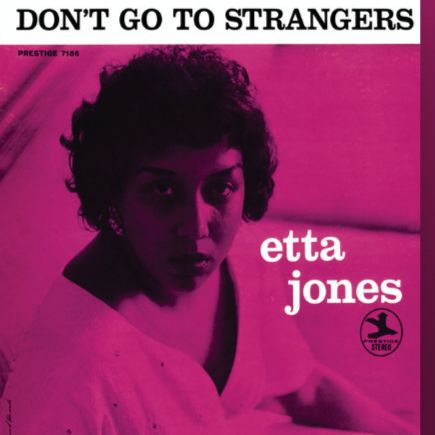L’art du jazz vocal selon Etta Jones
Enregistré en 1960 pour le label indépendant Prestige, Don’t Go to Strangers demeure l’album qui a révélé Etta Jones au grand public. Accompagnée de musiciens d’exception – Frank Wess (flûte et saxophone ténor), Richard Wyands (piano), Skeeter Best (guitare), George Duvivier (basse) et Roy Haynes (batterie) – la chanteuse y trouve l’écrin idéal pour mettre en valeur son timbre chaleureux et expressif. L’album, capturé en une seule session, témoigne d’une spontanéité rare qui confère à l’ensemble une intensité intacte plus de soixante ans après son enregistrement.
Bien que la carrière discographique de Jones ait débuté dès 1944, avec plusieurs disques pour RCA puis un album pour King Records en 1957, c’est véritablement Don’t Go to Strangers qui fit d’elle une vedette. La chanson-titre, ballade bouleversante par sa simplicité et son authenticité, devint un disque d’or et atteignit à la fois le Top 40 des charts pop et la cinquième place des classements R&B. Cette réussite soudaine valut à Jones d’être perçue comme une ‘nouvelle sensation’, alors même qu’elle travaillait déjà depuis plus de quinze ans.
La critique fut immédiatement élogieuse. Le magazine Dusty Groove souligne la sensualité irrésistible du morceau-titre, qualifiant Don’t Go to Strangers de chef-d’œuvre et l’un des plus beaux de la chanteuse. La voix de Jones, à la fois tendre et puissante, se déploie avec une aisance qui révèle un art du phrasé directement hérité du jazz vocal mais nourri d’une intensité émotionnelle universelle. Chaque note semble habitée, chaque nuance mesurée pour instaurer une proximité intime avec l’auditeur.
Les arrangements, volontairement dépouillés, laissent toute la place au timbre et au souffle de la chanteuse. Des standards comme If I Had You ou All the Way trouvent ici une nouvelle jeunesse: soutenus par une section rythmique d’une grande sobriété, ils deviennent autant de miniatures vocales où Jones brille par sa justesse et son lyrisme contenu. Les musiciens, tous des figures établies du jazz, jouent avec une retenue et une élégance qui renforcent l’équilibre de l’ensemble.
En 2008, l’album fut intronisé au Grammy Hall of Fame, consacrant son importance dans l’histoire du jazz vocal. Sorti à une époque charnière où le jazz explorait de nouvelles voies – du hard bop au free jazz – Don’t Go to Strangers rappelle avec force la pertinence des chanteuses dans un univers souvent dominé par les instrumentistes. Fidèle aux racines du swing et du blues, mais ouverte à une sensibilité contemporaine, Etta Jones s’y impose comme l’héritière des grandes voix féminines du jazz, aux côtés de Billie Holiday, Sarah Vaughan ou Dinah Washington.
El arte del jazz vocal según Etta Jones
Grabado en 1960 para el sello independiente Prestige, Don’t Go to Strangers sigue siendo el álbum que reveló a Etta Jones al gran público. Acompañada por músicos excepcionales – Frank Wess (flauta y saxofón tenor), Richard Wyands (piano), Skeeter Best (guitarra), George Duvivier (contrabajo) y Roy Haynes (batería) – la cantante encontró aquí el marco perfecto para realzar su timbre cálido y expresivo. El disco, registrado en una sola sesión, conserva una espontaneidad rara que confiere al conjunto una intensidad intacta más de sesenta años después de su grabación.
Aunque la carrera discográfica de Jones comenzó ya en 1944, con varios discos para RCA y un álbum para King Records en 1957, fue verdaderamente Don’t Go to Strangers el que la convirtió en una estrella. La canción homónima, una balada conmovedora por su sencillez y autenticidad, se convirtió en disco de oro y alcanzó tanto el Top 40 de las listas pop como el quinto lugar en las de R&B. Este éxito repentino la presentó como una ‘nueva sensación’, pese a que llevaba más de quince años trabajando en la escena.
La crítica fue inmediata y entusiasta. La revista Dusty Groove subrayó la sensualidad irresistible del tema principal, calificando Don’t Go to Strangers de obra maestra y de uno de los más bellos de la cantante. La voz de Jones, al mismo tiempo tierna y poderosa, se despliega con una naturalidad que revela un arte del fraseo heredado del jazz vocal, pero impregnado de una intensidad emocional universal. Cada nota parece habitada, cada matiz cuidadosamente dosificado para instaurar una proximidad íntima con el oyente.
Los arreglos, deliberadamente sobrios, dejan todo el espacio a la voz de la cantante. Estándares como If I Had You o All the Way adquieren aquí una nueva vida: sostenidos por una sección rítmica contenida, se convierten en miniaturas vocales donde Jones brilla por su precisión y su lirismo controlado. Los músicos, todos figuras consolidadas del jazz, tocan con una elegancia mesurada que refuerza la cohesión del conjunto.
En 2008, el álbum fue incorporado al Grammy Hall of Fame, consagrando su importancia en la historia del jazz vocal. Publicado en una época de transición en la que el jazz exploraba nuevos caminos – del hard bop al free jazz – Don’t Go to Strangers recuerda con fuerza la vigencia de las cantantes en un universo a menudo dominado por instrumentistas. Fiel a las raíces del swing y del blues, pero abierta a una sensibilidad contemporánea, Etta Jones se consagra como heredera de las grandes voces femeninas del jazz, junto a Billie Holiday, Sarah Vaughan y Dinah Washington.
L’arte del jazz vocale secondo Etta Jones
Registrato nel 1960 per l’etichetta indipendente Prestige, Don’t Go to Strangers rimane l’album che rivelò Etta Jones al grande pubblico. Accompagnata da musicisti d’eccezione – Frank Wess (flauto e sax tenore), Richard Wyands (pianoforte), Skeeter Best (chitarra), George Duvivier (contrabbasso) e Roy Haynes (batteria) – la cantante trova qui la cornice ideale per valorizzare il suo timbro caldo ed espressivo. L’album, catturato in un’unica sessione, testimonia una spontaneità rara che conferisce all’insieme un’intensità intatta più di sessant’anni dopo la sua incisione.
Sebbene la carriera discografica di Jones fosse iniziata già nel 1944, con vari dischi per la RCA e un album per la King Records nel 1957, fu davvero Don’t Go to Strangers a consacrarla come stella. La title track, una ballata struggente per la sua semplicità e autenticità, divenne disco d’oro e raggiunse sia la Top 40 delle classifiche pop sia il quinto posto nelle classifiche R&B. Questo successo improvviso la fece percepire come una ‘nuova sensazione’, benché fosse attiva da oltre quindici anni.
La critica fu subito entusiasta. La rivista Dusty Groove sottolineò la sensualità irresistibile del brano principale, definendo Don’t Go to Strangers un capolavoro e uno dei più belli della cantante. La voce di Jones, insieme dolce e potente, si dispiega con una naturalezza che rivela un’arte del fraseggio ereditato dal jazz vocale ma nutrito di un’intensità emotiva universale. Ogni nota sembra abitata, ogni sfumatura calibrata per creare un’intimità diretta con l’ascoltatore.
Gli arrangiamenti, volutamente essenziali, lasciano tutto lo spazio al respiro e al timbro della cantante. Standard come If I Had You o All the Way trovano qui nuova vita: sostenuti da una sezione ritmica sobria, diventano miniature vocali in cui Jones brilla per precisione e lirismo misurato. I musicisti, tutti figure affermate del jazz, suonano con una sobrietà ed eleganza che rafforzano l’equilibrio complessivo.
Nel 2008, l’album fu inserito nel Grammy Hall of Fame, a consacrarne l’importanza nella storia del jazz vocale. Pubblicato in un’epoca cruciale in cui il jazz esplorava nuove direzioni – dall’hard bop al free jazz – Don’t Go to Strangers riafferma con forza la rilevanza delle cantanti in un universo spesso dominato dagli strumentisti. Fedele alle radici dello swing e del blues, ma aperta a una sensibilità contemporanea, Etta Jones si impone come erede delle grandi voci femminili del jazz, accanto a Billie Holiday, Sarah Vaughan e Dinah Washington.
The art of vocal jazz according to Etta Jones
Recorded in 1960 for the independent label Prestige, Don’t Go to Strangers remains the album that brought Etta Jones to wide public attention. Accompanied by exceptional musicians – Frank Wess (flute and tenor saxophone), Richard Wyands (piano), Skeeter Best (guitar), George Duvivier (bass), and Roy Haynes (drums) – the singer found here the perfect setting to showcase her warm and expressive tone. Captured in a single session, the album conveys a rare spontaneity that still resonates with undiminished intensity more than sixty years after its release.
Although Jones’s recording career had begun as early as 1944, with several records for RCA and an album for King Records in 1957, it was truly Don’t Go to Strangers that made her a star. The title track, a ballad striking for its simplicity and authenticity, became a gold record and reached both the Top 40 on the pop charts and fifth place on the R&B charts. This sudden success led to her being perceived as an ‘overnight sensation’, even though she had been active for over fifteen years.
Critical response was immediately enthusiastic. The magazine Dusty Groove highlighted the irresistible sensuality of the title track, calling Don’t Go to Strangers a masterpiece and one of the singer’s finest works. Jones’s voice, both tender and powerful, unfolds with an ease that reveals a phrasing deeply rooted in the vocal jazz tradition but infused with universal emotional intensity. Every note feels inhabited, every nuance carefully measured to create a sense of intimacy with the listener.
The arrangements, deliberately understated, leave full space for the singer’s tone and breath. Standards such as If I Had You and All the Way are given fresh life here: supported by a restrained rhythm section, they become vocal miniatures in which Jones shines with accuracy and controlled lyricism. The musicians, all established jazz figures, play with restraint and elegance that reinforce the album’s balance.
In 2008, the album was inducted into the Grammy Hall of Fame, affirming its significance in the history of vocal jazz. Released at a pivotal moment when jazz was exploring new directions – from hard bop to free jazz – Don’t Go to Strangers powerfully reaffirmed the importance of female singers in a universe often dominated by instrumentalists. Faithful to the roots of swing and blues yet open to contemporary sensibilities, Etta Jones stands as the heir to the great female voices of jazz, alongside Billie Holiday, Sarah Vaughan, and Dinah Washington.


